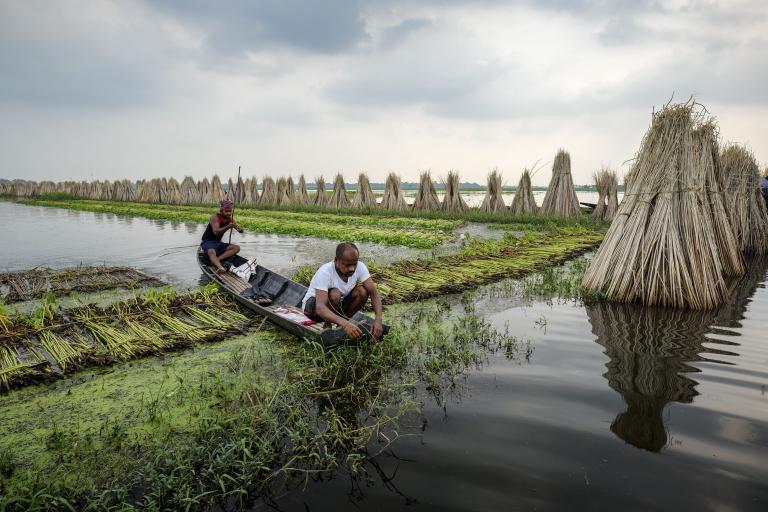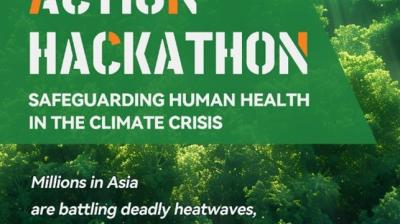WMO and FAO strengthen collaboration

WMO Secretary-General Celeste Saulo and FAO Director-General Qu Dongyu signed a Memorandum of Understanding on 30 May to extend and strengthen an existing partnership for another ten years.
“We commit to collaborate more closely on areas of mutual interest in relation to weather, ocean, climate, hydrological, and related environmental services and their application for resilience and adaptation of the global agrifood system,” said Celeste Saulo.
WMO and FAO already work closely together to ensure that climate services are applied in the agriculture sector by farmers, agricultural planners and policy makers, and that they are relevant and actionable.
FAO has an important role to play in the Early Warnings For All initiative spearheaded by WMO and the UN Office for Disaster Risk Reduction. Early warnings and seasonal climate outlooks are crucial for resilience, adaptation, and anticipatory action in agriculture.
FAO is a partner on the Integrated Drought Management Programme (IDMP) and has collaborated with WMO on various country and regional support activities for drought activities across Africa, Eastern Europe and South America. The programme is co-led by WMO and the Global Water Partnership and supports governments and other stakeholders at all levels in implementing Integrated Drought Management by providing scientific, policy, technical and management guidance.
“We need to continue the ongoing joint resource mobilisation efforts between the two organisations to enhance the application of climate services in agriculture,” said Celeste Saulo.
Memorandum of Understanding
The MoU covers five key areas:
- Agro-meteorological services for climate resilient development, including early warning systems in the framework of Early Warnings for All.
- Partnerships and policy dialogue for climate information and services across and within systems as part of integrated climate actions.
- Inter-agency initiatives for disaster risk reduction and climate risk management.
- Data, tools and methodologies to support weather, climate, hydrological, marine and environmental services.
- Resource mobilization and knowledge transfer for climate-resilient development through, for instance, joint proposal development for the Green Climate Fund (GCF), the Global Environment Facility (GEF), The Adaptation Fund and various other mechanisms.
Agriculture and food security
Agriculture is among the sectors that are the most dependent on weather and climate and vulnerable to meteorological hazards, climate variability (El Niño and La Niña) and climate change.
It therefore features prominently in the National Adaptation Plans (NAPs) of many developing countries, both in terms of vulnerability to climate change as well as prioritization of adaptation actions. It is also a sector which contributes to emissions of greenhouse gases including methane and nitrous oxide and where there is big scope for emission reductions.
As a result, many of the NMHSs have agro-meteorological divisions, whose role is to ensure that climate information is relevant, actionable and accessible by farmers, agricultural extension services, organizations involved in food security emergency response, and agriculture and food security planners and policy makers.
Existing collaboration
WMO and FAO have collaborated on a number of joint reports, including the WMO State of Climate Services for Agriculture report of 2019. FAO is a valued contributor to WMO’s State of the Global Climate reports.
WMOs first approved Adaptation Fund project the US$6.8 million Agricultural Climate Resilience Enhancement Initiative (ACREI) in East Africa (Ethiopia, Kenya and Uganda), was jointly developed with FAO, who are also an executing entity on the project, ensuring that climate information results in climate adaptation in agriculture.
WMO/FAO collaborations to support anticipatory action (using prediction to act before major seasonal events to mitigate impacts). This includes the ENSO Cell of the Inter-Agency Standing Committee, led by FAO. WMO leads the forecasting side of this. There is also the IASC Early Warning Early Action Reports which feed into many of FAO's Anticipatory Actions.
FAO and WMO are also collaborating on the WMO-FAO-UNESCO Task Team on Indigenous and Local Knowledge (TT-ILK) that aims to document best practices and support resource mobilization for enhancing the use of indigenous and local agroclimatic knowledge.










